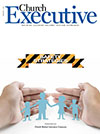
Safeguard your church — and your people
![]()
“People want to see their church as an extension of their home — a place that’s filled with their family and friends,” but they don’t have the same level of control at church as at their home, says Denise Allen, the crime prevention coordinator for the Santa Rosa County Sheriff’s Office in Florida. “Crimes happen when there’s desire, opportunity and ability. We can help churches eliminate the opportunity.”
Do a security review
Many police and sheriff’s departments have people who will tour a church facility and look for vulnerabilities, review policies, and make recommendations for keeping the church safe. Some departments also will patrol church grounds. Joining a local neighborhood watch program and setting up a church safety team also go a long way toward keeping your church safe.
Address physical vulnerabilities
Help minimize risk of theft and intrusion by evaluating the following:
Doors and locks. Exterior doors should be solid wood or metal, and exterior doors should have a heavy-duty, single-cylinder deadbolt, Allen advises. The quality of the lock on interior doors depends on what’s stored in the room. “The Sunday school room might have a different lock than the room where you store church records and money,” Allen says.
Access. Limit building access during times when few people are on the site — especially in the early morning or evening. At the very least, lock any and all doors not in use. Some churches lock all doors and require visitors to be buzzed in through a security system during “off” hours.
Parking lots. Encourage congregants to remove valuables and lock their car doors. “Too often, people think nothing will happen in a church parking lot,” Allen points out.
Vegetation. Make it hard to hide near windows and doors by keeping vegetation low and trimmed or by using “hostile” vegetation that’s hard to climb through, such as holly bushes.

Lights. Illuminate exterior areas and use motion detector sensors. “A thief can’t be sure someone didn’t spot them and turn the light on,” Allen says.
Outbuildings. The doors on outbuildings should be locked at all times, especially on buildings that store expensive lawn and maintenance equipment or dangerous chemicals.
Little-used entrances. The simple solution: keep them locked.
Keys. Limit who has access to keys and who’s allowed to duplicate them.
Money. Although many churches have gone to digital collections, it still is common to pass a collection plate at most churches.
“Keep a very limited amount of cash on hand and have an appropriate safe for your church — possibly a drop safe that can only be opened by certain people at certain times of day,” Allen recommends. “If you make cash deposits at the bank, have an irregular deposit schedule and use different people to handle the transaction so a thief can’t easily determine your pattern.”
Consider adding a security system
A recent study by Campus Security Magazine shows that most burglars are deterred by the presence of alarms, outdoor cameras and surveillance equipment. Investigate the wealth of available security options, including cameras, alarms, perimeter and glass-break sensors, panic buttons and coded entry pads. Large churches with many buildings might consider hiring a security service.
Design and implement effective policies and procedures
The best in physical security systems can’t make up for poor policies or enforcement.
Have a check-in system. If practical, consider having a central check-in area where all visitors have to give their name and the reason for being at the church. Visitors also should sign in and get an ID badge. “This can be tricky,” Allen says. “Churches don’t want to feel unwelcoming or do anything that conflicts with their mission.”
Larger congregations also should consider requiring identification badges for all staff members.
Consider the time of day. “Train people to do tasks in a safe way,” Allen advises. “For instance, they shouldn’t be taking garbage out to the secluded dumpster at night.”
Use the buddy system. Ideally, staff members and volunteers should never be on church grounds alone.
Communicate. When few people are on a site, each person should have some kind of communication device with them at all times, such as a cellphone or radio.
Hire smart. “Good hiring practices and background checks help minimize the risk of hiring people with bad intentions,” Allen says.
Train. Employees and volunteers must be on the lookout for unusual or suspicious behavior and know how to respond to disruptive individuals, what to do in the event of a robbery or intrusion and to report any criminal events. Don’t assume they know how and when to handle these types of events — train them.
The challenge of homelessness
Churches in urban locations might encounter issues with homeless people congregating near or breaking into the church. To help meet the needs of the homeless without compromising church security, Allen recommends keeping a list of shelters for staff members to hand out and partnering with food banks to provide basic foodstuffs.
This article is provided by Church Mutual Insurance Company in Merrill, WI. Risk Reporter newsletters are available from the company for religious organizations, schools, camps and conference centers and senior living facilities.


